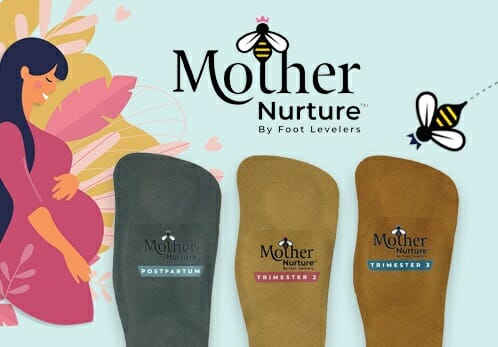Improving musculoskeletal health during and after pregnancy is a priority for Foot Levelers, the world’s leading provider of hand-crafted custom orthotics, serving multi-disciplinary professionals and clinicians throughout the country and worldwide.
This is an opportunity to share information with Medical News Device readers about the documented value of Mother Nurture™, a multi-part system based on a set of custom, lightweight orthotics for use during the second and third trimesters. A third set is for postpartum use as the mother recovers from pregnancy and delivery through the first year after the baby’s birth.
Custom, flexible orthotics rely upon natural pain relief, allowing women to forego pharmaceutical intervention – an important concern since the physiology of pregnancy affects the pharmacokinetics of medications used, and certain medications can reach the fetus and cause harm.
Designed by women and crafted for women, these innovative products reflect a keen understanding of the changes that a woman’s body undergoes during pregnancy. It is critical for pregnant women to address back pain, avoid injury and decrease the chance for long-term or chronic back pain following childbirth.

Relieving Back Pain During Pregnancy
One of the most common complaints during pregnancy is back pain. In fact, it’s estimated that more than half of all women experience some degree of back discomfort. Most back pain is related to the physical changes that happen during pregnancy, including hormones, changes in the center of gravity, and posture. Unfortunately, it typically intensifies and gets worse as pregnancy progresses, and one of the many reasons that the Mother Nurture system includes uniquely designed sets for each trimester and post-partum.
Throughout pregnancy, hormones affect a woman’s muscles and joints. As a woman’s body changes to accommodate the growth of her developing baby and begins preparations for labor and delivery, the body releases relaxin, a natural hormone that prepares the uterus for birth and softens the connective tissue between skeletal bones. This can cause joint laxity and instability during pregnancy, leading to back pain, joint pain and mechanical issues. Relaxin levels can stay elevated in a woman’s body between six-18 months after birth.
As the uterus grows and becomes heavier, a woman’s center of gravity changes. This can lead to problems with balance and the potential for falls. The weight of the baby and weakening of belly muscles pulls the lower spine forward, adding strain to back muscles. The hormone progesterone also relaxes muscles and loosens ligaments and joints, especially in the pelvic area, which may also lead to lower back pain.
Many women respond by leaning back in an awkward posture and drop their shoulders, often accompanied by knee rotation from the regular positions. Collectively, the extra weight and body changes in pregnancy along with these softened, loosened joints, ligaments and connective tissue that support the musculoskeletal system, increase back strain and pain — and even lead to injury.
Custom-Crafted Flexible Orthotics vs. “Off-the-Shelf” Products
Understanding the Difference
Over-the-counter insoles and inserts from the supermarket or drugstore fall woefully short in providing relief for expectant mothers who report that these physiological changes often divert their attention from daily tasks to focusing on accommodations that reduce or eliminate discomfort. Women that purchase over-the-counter insoles and inserts that are placed into their footwear often say that these products are not responsive to the rapid changes that progress during pregnancy, including weight gain and gait changes. Additionally, OTC inserts are ineffective in resolving musculoskeletal aches and pains that commonly occur during pregnancy because they aren’t tailor-made for a woman’s unique foot structure.
Furthermore, one-size-fits-all insoles and inserts fail to account for a unique foot and may not fit properly in a shoe. Custom, flexible orthotics are clearly a better option since they are specifically made for individual use, are fabricated to not only support walking but also to improve balance and forward movement which directly impacts energy levels and can help prevent fatigue. When these objectives are met, the custom orthotic provides the support that is needed for the feet and for overall body health.
Finally, the innovative design and fabrication only available from Mother Nurture stabilizes all three arches of the foot, resolving the vast differences in foot structure between women and men. The female foot differs from the male in several ways:
- Tends to have a narrower heel in relation to the forefoot
- Forefoot is wider and causes the biomechanical forces on the foot to be distributed differently
- Narrower overall than a man’s foot relative to its length
- Achilles tendon is smaller in circumference and strength, but also shorter
Orthotics for women should be designed to support the longitudinal and anterior transverse arches to provide metatarsal passing and to limit excessive heel motion. Studies show that small, dense metatarsal arch pads positioned more distally reduce the pressures on the metatarsal heads and can decrease plantar pressures by an average of 17%, with pain reduced by 71%.
Foot Dysfunction
Addressing foot dysfunction during pregnancy is an important step, since most people never think of their feet as a contributing factor for back pain. Issues associated with foot dysfunction are often the root cause of many spine problems and the accompanying pain – especially during pregnancy. Today, there is growing recognition that the feet are the foundation of the body and the kinetic chain that is responsible for the optimal functioning of the knees, hips, and back.
Pregnancy weight gain and tissue laxity may also cause permanent changes to a mother’s foot anatomy, leading to systemic issues during postpartum and beyond. If a woman doesn’t receive proper postpartum care, she may continue to experience lumbopelvic pain, leading to chronic pain. In a recent European study, 33% of postpartum mothers were classified with lumbopelvic pain, with 40% reporting moderate to severe disability.
Easing Back Pain During Pregnancy – and Beyond
Each pair of custom-crafted flexible orthotics addresses the patient’s unique foot structure and the anticipated changes in her body during and right after pregnancy. As pain symptoms typically occur during the second and third trimesters, the system focuses on alleviating these naturally occurring symptoms. The orthotic sets provide specific support for functional alignment, movement and balance. As the orthotics are constructed of durable materials, women can wear them daily with their everyday shoes.
Custom-crafted flexible orthotics are built from a single scan using proprietary algorithms compatible with the manufacturer’s technology and programs. Doctors who currently prescribe these products express confidence in their value for patients who are pregnant.
The orthotic system is specifically designed for a woman’s body during and after pregnancy, providing a superior advantage over unisex options, which typically require a wider footbed to accommodate the anatomy of male feet. They also address other issues during and after pregnancy, such as swelling and stress on the feet – which collapse the three arches and cause full-body imbalance.
Case Examples
The following real-world case examples describe the experiences of two working women who wore Mother Nurture custom flexible orthotics throughout their pregnancies.
- An ICU nurse/manager reported that during her pregnancy, custom crafted, flexible orthotics helped her complete her workday comfortably without the added stress of returning home with aches and pains. She was relieved that throughout her work shift, the flexible orthotic design anticipated the anatomical changes that her body was undergoing and that they allowed her to maintain a regular work week with no physical challenges.
Her testimonial underscores the value: “I didn’t have back pain my entire pregnancy — even after my shift. It was a major relief. I was also more focused I was also more focused and active at work, so I could be more involved in caring for my patients. You tend to focus on yourself when you have pain, so the orthotics helped me stay comfortable during my pregnancy.”
- Another woman who spent most of the working day on her feet and continued employment until the day before her due date reported having no back pain and very minimal foot pain during a regular 40-hour work week. She also worked out regularly and took long walks.
In her own words, “I probably couldn’t have done that if I had not been wearing something that was supporting me. I went one day without wearing them (the orthotics), and my feet swelled considerably – I definitely learned my lesson.”
Editor’s Note: Jamie Greenawalt, an accomplished senior-level executive with global business development, operations, and advisory experience, has carved out an exceptional career path, one that ultimately circled back to the family business where she establishes the third generation of leadership. Prior to rejoining Foot Levelers, Inc. in 2020, Ms. Greenawalt served as the Operations Officer with World Bank (South Asia Region); during her tenure, Jamie co-led a women’s entrepreneurship program spanning eight countries. This program was a pivotal project focused on driving impactful empowerment and infrastructure initiatives. Jamie’s twenty-plus years of domestic and international leadership experience is evident in her professional impact: her success in developing exceptional, cross-functional teams and her track record of achieving peak business development results.
Jamie’s passion for ongoing education, research, and technological advancements that serve to advance the healthcare community is a backbone imperative and, thusly, informs her leadership approach at Foot Levelers, Inc. This commitment to innovation and partnership permeates operational decisions across all disciplines and solidifies the company’s stronghold as the market (and thought) leader in the custom orthotics industry.
